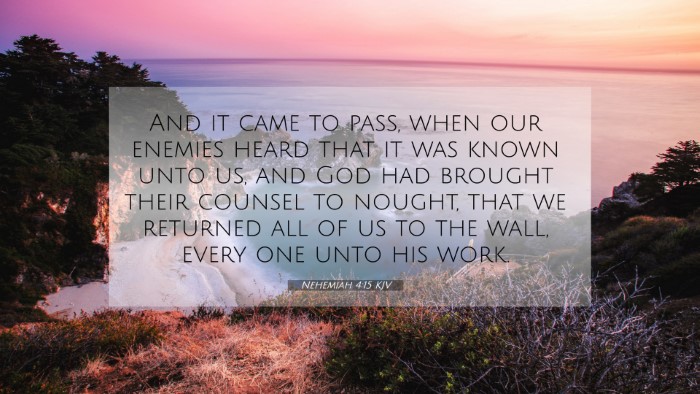Understanding Nehemiah 4:15
Nehemiah 4:15 states, "And it came to pass, when our enemies heard that it was known unto us, and God had brought their counsel to nought, that we returned all of us to the wall, every one unto his work." This verse captures a pivotal moment in the narrative of Nehemiah, illustrating the interplay between divine intervention and human perseverance.
Summary of Context
This verse is situated in the larger context of Nehemiah's leadership as he rebuilds the walls of Jerusalem in the face of opposition. The enemies of the Jews—Sanballat, Tobiah, and others—are actively trying to thwart the reconstruction efforts. In response to the threats, Nehemiah encourages the people, emphasizing reliance on God.
Detailed Meaning and Analysis
The combined insights from public domain commentaries like Matthew Henry's, Albert Barnes', and Adam Clarke's reflections on Nehemiah 4:15 present a multifaceted understanding:
- Divine Awareness: The phrase "when our enemies heard that it was known unto us" indicates the awareness of God’s protective hand. This suggests that God not only knows our struggles but actively works against those who plot against His people. Matthew Henry notes that God has a way of revealing the plots that threaten His work.
- God's Intervention: The mention of "God had brought their counsel to nought" is a testament to God's sovereignty. Albert Barnes emphasizes that God works behind the scenes to invalidate the machinations of the adversaries, which ultimately serves as a source of encouragement to the workers.
- Collective Action: “...that we returned all of us to the wall, every one unto his work” reflects the theme of unity and determination among the Jews. Adam Clarke highlights the importance of collective effort in the work of God, where each individual has a role to play in rebuilding the wall, symbolizing the body of Christ working together in harmony.
- Restoration and Persistence: The act of returning to work signifies resilience in the face of adversity. Nehemiah's leadership fosters a spirit of commitment among the people, reinforcing Barnes' assertion that perseverance is crucial when confronting obstacles.
- Trust in God: Implicit in this verse is the principle that trusting in God results in empowerment to continue the work despite setbacks. This aligns with the broader biblical theme of faith leading to action.
- The Role of Prayer: Earlier verses in the chapter show Nehemiah praying for strength and intervention. This reliance on prayer is a crucial step discussed by Wilson, which leads to confidence in action.
Cross-References
Nehemiah 4:15 connects with several other biblical texts that illuminate its themes of divine protection and unified action:
- Psalm 124:2-3: "If it had not been the Lord who was on our side, when men rose up against us..." This psalm reflects the same reliance on God in times of trouble.
- Isaiah 54:17: “No weapon formed against you shall prosper,” reinforces God's promise of protection.
- Romans 8:31: "If God is for us, who can be against us?" A New Testament promise mirroring Nehemiah's confidence in God.
- Philippians 4:13: "I can do all things through Christ who strengthens me," illustrating the empowerment that comes from reliance on God.
- 1 Corinthians 3:9: "For we are God’s fellow workers; you are God’s field, God’s building," emphasizes the collaborative aspect of building God's kingdom.
- Hebrews 10:24-25: "And let us consider how we may spur one another on toward love and good deeds," supporting the theme of community effort.
- Acts 4:31: "And when they had prayed, the place where they were assembled together was shaken; and they were all filled with the Holy Spirit," highlighting the power of prayer in advancing God's work.
Conclusion
Nehemiah 4:15 serves as a powerful reminder of the importance of God's presence in our endeavors and the necessity of communal effort in fulfilling His work. The intertwining themes present in this verse encourage believers to engage in prayer, trust in divine intervention, and work together towards common goals.
Further Study and Cross-Referencing
For those interested in bible verse cross-references and better understanding biblical connections, utilize tools like a bible concordance and bible cross-reference guide. They can provide valuable insights into thematic verse connections and serve as essential resources for bible cross-reference study.














